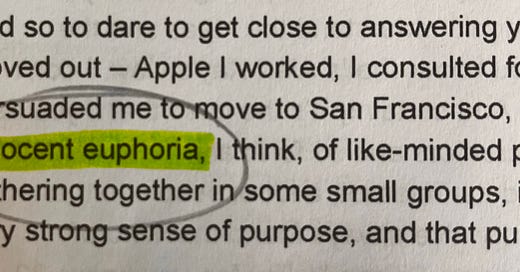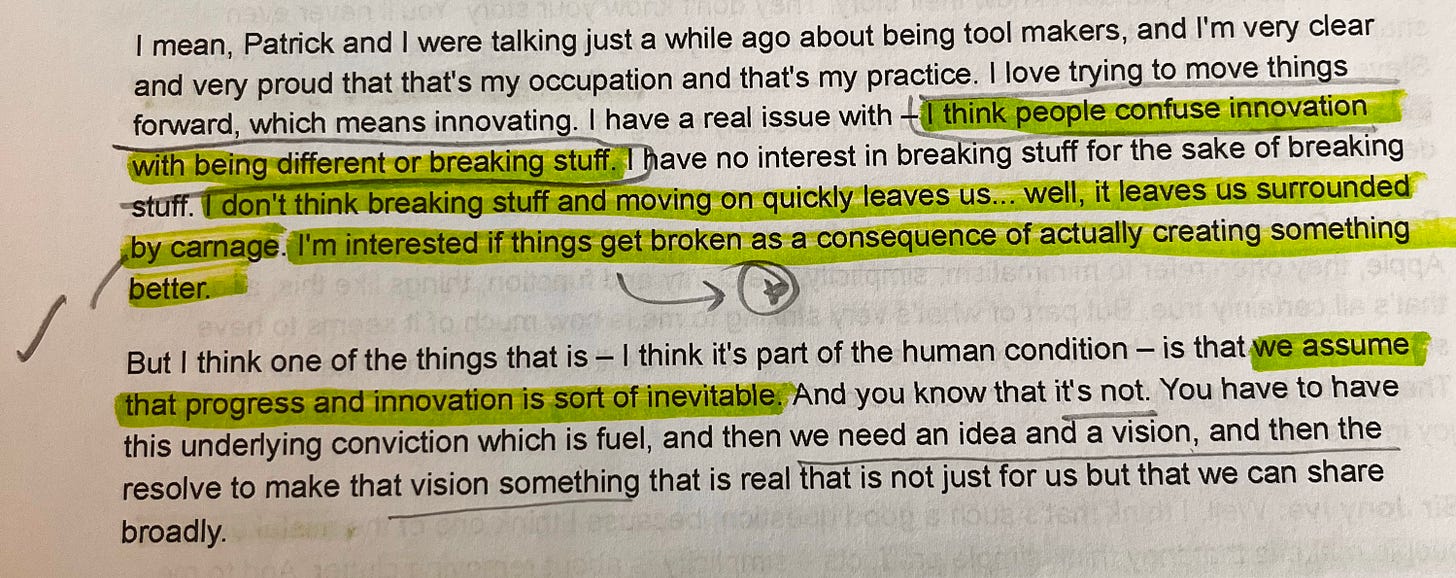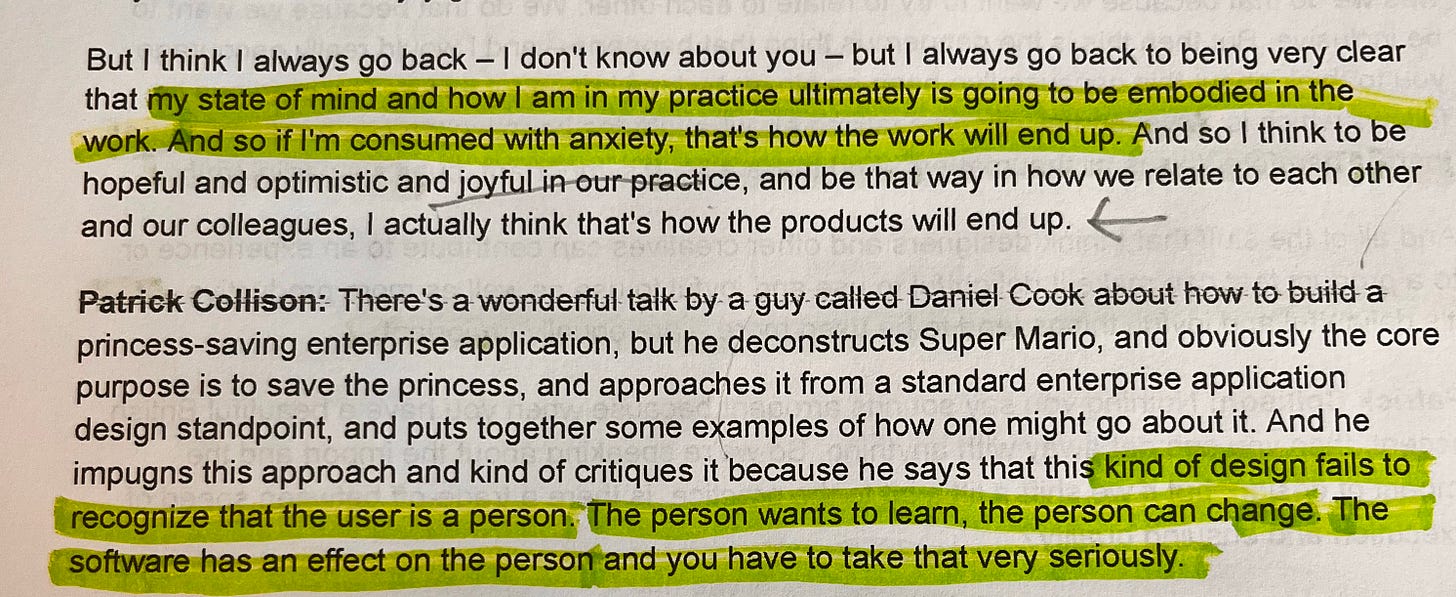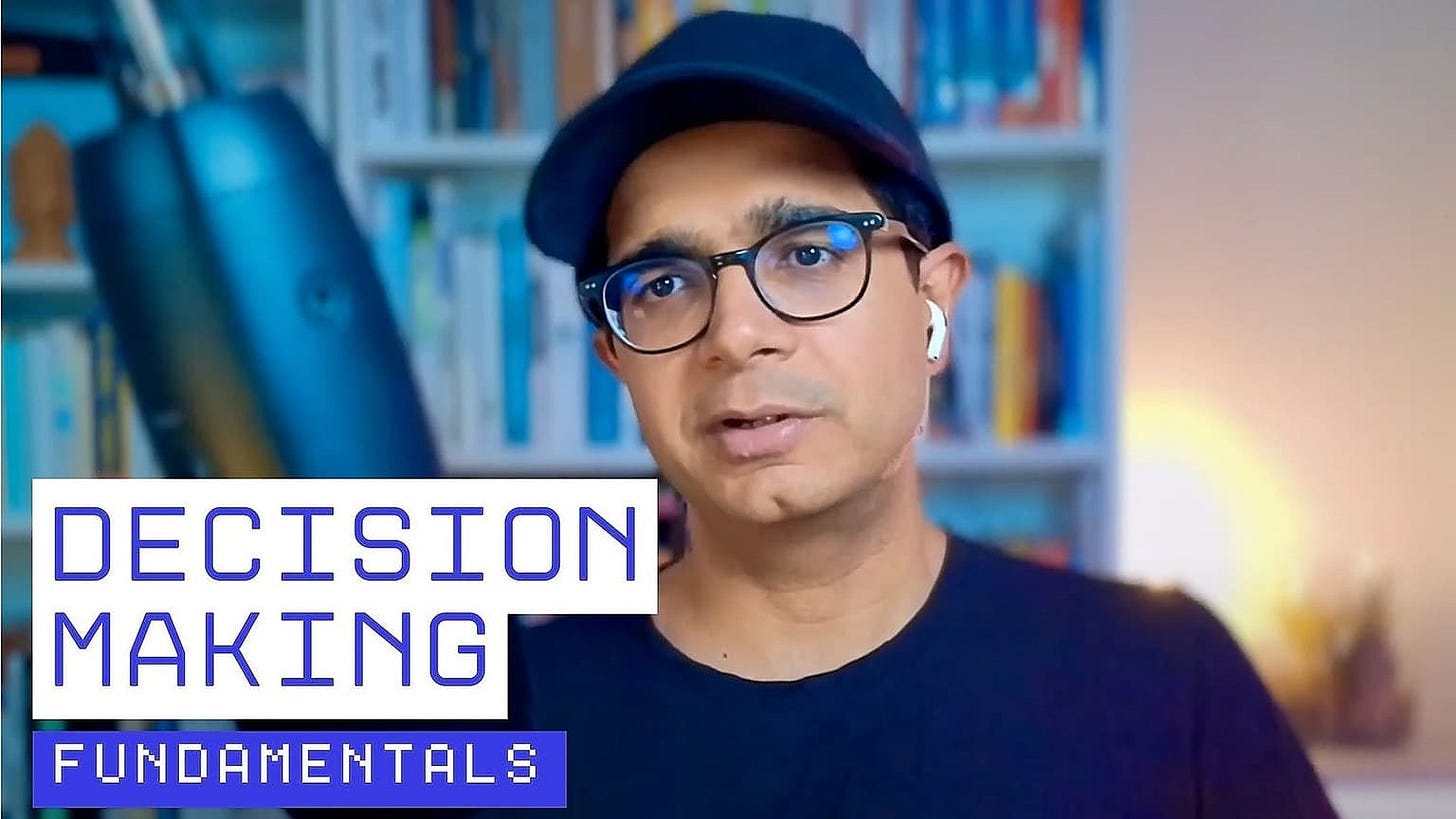Innocent Euphoria and more to learn from Jony Ive
A recent conversation on stage between the legendary designer Jony Ive and Stripe CEO Patrick Collison was posted online. I framed it as the highest signal-to-noise ratio in a content I've come across recently. I did a deep reflection over the weekend on the lessons from the conversation and captured it in short burst, sometimes quoting the conversation and sometimes framing it as a way for me to understand and apply. I hope you enjoy this. I highly recommend arriving at your own learning, ideas and things to think and reflect by watching the conversation in repeat.
On Innovation
We assume that progress and innovation is sort of inevitable. Its not.
People confusing innovation with being different or breaking stuff. Instead of surrounding by carnage by breaking stuff and moving quickly, its interesting if things get broken as a consequence of actually creating something better
On giving damn about the customer
Sincerely elevate the species
Somebody gave a “damn” about me
Avoiding “We’re done when we solved a functional imperative” - not the characteristic of an evolved society
Treating a customer when they use your product : Way of expressing creator’s gratitude to the species
On Simplicity
Simplicity is not about building desiccated, soulless product - mistake that people make they think simple products is about removing clutter. Simplicity to me is trying to succinctly express the essence of something and its purpose and its role in our life
On state of mind and reflection on your product
My state of mind and how I am in my [work] practice ultimately is going to be embodied in the work.
Be hopeful and optimistic and joyful in your practice
On measuring impact of design
Be aware of the kind of design that fails to recognize that the user is a person - the person wants to learn, the person can change.
The software has an effect on the person and you have to take that very seriously.
People generally want to talk about product attributes that you can measure easily with a number : schedule, cost, speed, weight etc. You can’t measure easily the contribution of “creatives” with a number
If it’s delightful and joyful, things tend to be used more
On choosing between quality, speed and cost
Hard to do quality and speed and cost and other things
There is beauty to working efficiently, and I think we can say that’s speed
How can we work wonderfully efficiently to create something wit breathtaking quality
On ideas
Ideas are ethereal thoughts and fragile concepts that are precarious
People are just desperate to speak and to be heard in teams. Nothing kills most ideas, than people desperate to express an opinion. Opinions however aren’t ideas
You tend to miss really amazing ideas that came from a quiet place, from a quiet person
On team rituals
Doing things in teams that mean the relationship between team members is authentic and deep
Practice of making things for each other as a ritual. For the maker, it makes you vulnerable, and the receiver, it makes them grateful
Taking turns to have the teams come to each other’s homes and spend a day working. The host is slightly anxious and concerned about the potential judgement of their soft furnishings (self consciousness, awkwardness, anxiety). Guests are on better behavior than they were in a conference room
On work spaces
You think differently if you are designing for people and you are in someone’s living room and your sketchbook (work) is on their coffee table.
If you are designing for people, who would actually want to spend time in a conference room - those are soulless and depressing place
On care and carelessness
Most companies patronize consumers
We have the ability to sense care and know carelessness
Great cabinet maker finishes the backer of a drawer, even though it’s unlikely it will be seen
Mark of how evolved we are as people is what we do when no one sees. It’s powerful marker of who we truly are
If we elect to spend our time working “Not” caring about other people, they the consumers and creators equally suffer. That’s a corrosive existence
On utility and function
There is a false opposition between utility and aesthetics
When designing something that doesn’t work, its ugly
It’s very easy for everybody to have an opinion. It just doesn’t mean every opinion has the same weight
Sense of humanity in the object is a better guide than beauty
On design movements
There is incredible energy to mark the beginning of a movement
Beauty takes time
Lot of modernism was driven by the heady excitement about new materials, and the obsession was the manipulation of that new material
On taking responsibility
Even though there was no intention from the maker, there still needs to responsibilities for the unintended consequences that are far from pleasant
If you are involved in something that has poor consequence, you need to own it
On dealing with change
Big technological change impacts society
There needs to be time for society to stop and consider what is happening due to the technological change and how to assimilate and deal with shifts
Encouraging about AI that appropriate safety concerns are being discussed at the same time, not far too late
/END
The content above is from the full talk on Youtube, and I may have slightly adjusted some sentences to make it readable for this post.
***
Announcement
I have two courses online that are now available for everyone to access: Leadership Bootcamp, a two days live cohort based learning experience that had over 20 cohorts so far with amazing feedback. The other is a brand new course on Decision Making which I am launching from July 2025. Seats are limited for both cohort. Sign up today !









